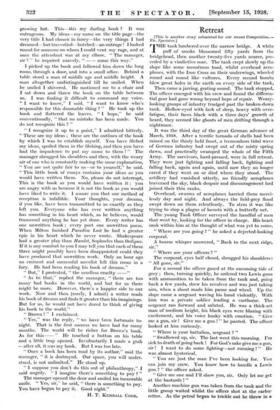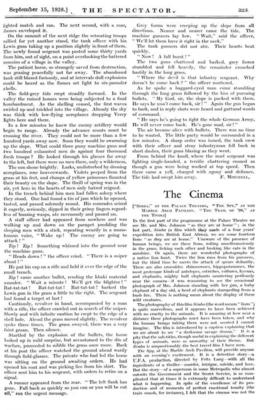Retreat
[This is another story submitted for our recent Competition.--• ED. Spectator.] THE tank lumbered over the narrow bridge. A white puff of smoke blossomed fifty yards from the bridgehead, then another twenty-five yards nearer, pre- ceded by a vindictive roar. The tank crept slowly up the slope like some monstrous toad, whilst overhead aero- planes, with the Iron Cross on their underwings, wheeled round and round like vultures. Every second bombs blew great holes in the earth on every side of the tank.
Then came a jarring, grating sound. The tank stopped. The officer emerged with his crew and found the differen- tial gear had gone wrong beyond hope of repair. Weary- looking groups of infantry trudged past the broken-down tank. Hollow-eyed with lack of sleep, heavy with over- fatigue, their faces black with a three days' growth of beard, they seemed like ghosts of men drifting through a nightmare.
It was the third day of the great German advance of March, 1918. After a terrific tornado of shells had been rained on the thinly held front, a tremendous tidal wave of German infantry had swept out of the misty spring dawn, and practically swamped the whole of the Fifth Army. The survivors, hard-pressed, were in full retreat.. They were just fighting and falling back, fighting and falling back, again and again, until now they no longer cared if they went on or died where they stood. The artillery had vanished utterly, no friendly aeroplanes traversed the sky, black despair and discouragement had joined their thin ranks.
Overhead, swarms of aeroplanes harried them merci- lessly day and night. And always the field-grey_ flood swept down on them relentlessly. To stem it was like trying to stop a plague of locusts with a butterfly net.
The young Tank Officer surveyed the handful of men that went by, looking for the officer in charge. His heart sank within him at the thought of what was yet to come.
" Where are you going ? " he asked a dejected-looking corporal.
A hoarse whisper answered, " Back to the next ridge, sir."
" Where are your officers " The corporal, eyes half closed, shrugged his shoulders : " All gone, sir."
For a second the officer gazed at the oncoming tide of grey ; then, turning quickly, he ordered two Lewis guns with ammunition to be taken from the tank and, going back a few yards, drew his revolver and was just taking aim, when a shout made him pause and wheel. Up the slope came a sergeant waving his hand violently. With him was a private soldier leading a carthorse. The sergeant ran forward and saluted. He was a thick-set man of medium height, his black eyes were blazing with excitement, and his voice husky with emotion. " Give me a gun, sir ! Give me a gun ! " he panted. The officer looked at him curiously.
" Where is your battalion, sergeant ? "
" Swallowed up, sir. The last went this morning. I'm sick to death of going back ! For God's sake give me a gun, sir I want to do some fighting—not running 1 " He was almost hysterical.
" You are just the man I've been looking for. You can join my crew. You know how to handle a Lewis gun ? " the officer asked.
" Give me one and I'll show you, sir. Only let me get at the bastards ! "
Another machine gun was taken from the tank and the little group waited whilst the officer shot at the carbu- retter. As the petrol began to trickle out he threw in a lighted match and ran. The next second, with a roar, flames enveloped it.
On the summit of the next ridge the retreating troops rallied for yet another stand, the tank officer with his Lewis guns taking up a position slightly in front of them. The newly found sergeant was posted some thirty yards from him, out of sight, on a point overlooking the battered remains of a village in the valley.
The patient horse, so strangely saved from destruction, was grazing peacefully not far away. The abandoned tank still blazed furiously, and at intervals dull explosions could be heard as the flames set light to six-pounder s hells.
The field-grey tide crept steadily forward. In the valley the ruined houses were being subjected to a final bombardment. As the shelling ceased, the first waves swirled up and trickled into the village. Already the sky was thick with low-flying aeroplanes dropping Verey lights here and there.
In a few minutes he knew the enemy artillery would begin to range. Already the advance scouts must be crossing the river. They could not be more than a few hundred yards away now. Soon they would be swarming up the slope. What could three puny machine guns and two hundred exhausted men do against four thousand fresh troops ? He looked through his glasses far away to the left, but there were no men there, only a wilderness.
The sun shone brightly. Larks, undisturbed by droning aeroplanes, rose heavenwards. Violets peeped from the grass at his feet, and clumps of yellow primroses flaunted their beauty on the slope. The thrill of spring was in the air, yet here in the hearts of men only hatred reigned.
In the trench behind him men had fallen asleep where they stood. One had found a tin of jam which he opened, tasted, and passed solemnly round. His comrades seized it eagerly, seriously, dipped in their grimy fingers regard- less of buzzing wasps, ate ravenously and passed on.
A staff officer had appeared from nowhere and was walking up and down on the parapet prodding the sleeping men with a stick, repeating wearily in a mono- tonous voice, " Wake up ! The enemy are going to attack ! "
Zip ! Zip ! Something whizzed into the ground near the machine guns.
" Heads down ! " the officer cried. " There is a sniper about ! "
He put his cap on a rifle and held it over the edge of the small trench.
Zip ! came another bullet, rending the khaki material asunder. " Wait a minute ! We'll get the blighter ! "
Rat-tat-tat ! Rat-tat-tat ! Rat-tat-tat ! barked the Lewis gun in the grass a little to the right. The sergeant had found a target at last !
Cautiously, revolver in hand, accompanied by a man with a rifle, the officer crawled out in search of the sniper. Slowly and with infinite caution he crept to the edge of a shell hole. Ahead the grass moved slightly. The revolver spoke three times. The grass swayed, there was a very faint groan. Then silence.
Startled by the explosion of the bullets, the horse looked up in mild surprise, but accustomed to the din of warfare, proceeded to nibble the grass once more. Back at his post the officer watched the ground ahead warily through field-glasses. The private who had led the horse was sitting on the ground awaiting orders. He had opened his coat and was picking lice from his shirt. The officer sent him to his sergeant, with orders to retire on a signal.
A runner appeared from the rear. " The left flank has gone. Fall back as quickly as you can or you will be cut OM" ran the urgent message. Grey forms were creeping up the slope from all directions. Nearer and nearer came the tide. The machine gunners lay lOw. " Wait," said the officer. " We'll let them have it right in the neck."
The tank gunners did not stir. Their hearts beat quickly.
" Now ! A full burst ! "
The two guns chattered and barked, grey forms stumbled and fell heavily, the remainder crouched hastily in the long grass.
" Where the devil is that infantry sergeant. Why doesn't he come back ? " the officer muttered.
As he spoke a haggard-eyed man came stumbling through the long grass followed by the hiss of pursuing bullets. " My God, sir, the slope is packed with them. He says he won't come back, sir ! " Again the gun began to bark, and in reply shots were heard and guttural words of command.
"He says he's going to fight the whole German Army. He will never come back. He's gone mad, sir ! "
The air became alive with bullets. There was no time to be wasted. The little party would be surrounded in a few minutes. A sharp order was issued, the tank crew with their officer and stray infantryman fell back in short dashes, their guns blazing as they went.
From behind the knoll, where the mad sergeant was fighting single-handed, a terrific chattering ensued as though a gun were being worked at top speed. Then there came a yell, charged with agony and defiance.
The tide had swept him away. F. MITCHELL,







































 Previous page
Previous page